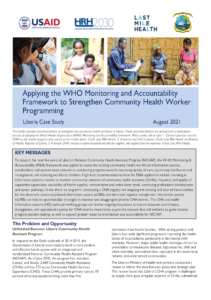07 Sep Applying the WHO Monitoring and Accountability Framework to Strengthen Community Health Worker Programming: A Case Study from Liberia
 In Liberia, community health assistants (CHAs) provide primary care to 70 percent of the country’s rural populations who live further than five kilometers from health facilities. The country’s National Community Health Assistant Program (NCHAP) leaders seek strategies to address last-mile supply chain gaps, irregular payment to CHAs, management and governance gaps, and concerns around the long-term sustainability of the program.
In Liberia, community health assistants (CHAs) provide primary care to 70 percent of the country’s rural populations who live further than five kilometers from health facilities. The country’s National Community Health Assistant Program (NCHAP) leaders seek strategies to address last-mile supply chain gaps, irregular payment to CHAs, management and governance gaps, and concerns around the long-term sustainability of the program.
In 2020 and 2021, looking ahead to the next five years of NCHAP, HRH2030—in partnership with Last Mile Health, the Liberian Ministry of Health, the World Health Organization (WHO) and other community health partners—applied the WHO Monitoring & Accountability (M&A) framework to help inform the future policy and strategic planning for the community health assistant workforce.
This 12-page case study takes an in-depth look at the CHA stakeholders and systems areas across the CHA lifecycle, including: investing in information systems’ metrics to monitor community selection of CHAs; the frequency and quality of supportive supervision; the availability of health supplies; and remuneration, continuing professional development, and career pathways. In the short- to long-term, developing a CHA registry and mapping the existing and desired functionalities for the electronic information systems can help to operationalize strategies to monitor and disaggregate priority CHA metrics. The CHA and health information systems (HIS) technical working groups can broker ongoing discussions to ensure adequate coordination, management, and operational capacity for CHA metrics investments to provide relevant data and evidence to guide routine program decision making, as well as support greater resource mobilization and sustainability for NCHAP.
Download the full case study, below.
Country: Liberia
Resource Type: Case study
Topic: Leadership and governance
DOWNLOAD





